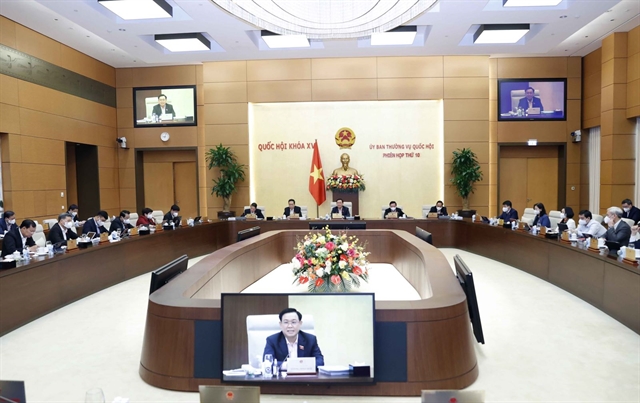
HÀ NỘI — The National Assembly Standing Committee on Monday morning discussed the draft revised Law on Radio Frequencies.
Presenting the Government's proposal to lawmakers, Deputy Minister of Information and Communications Phạm Đức Long said that the revised law aimed to strictly manage and effectively allocate the right to use radio frequencies, create a healthy competitive environment in telecommunications activities, promote the development of telecommunications infrastructure, and contribute to creating a foundation for national digital transformation, gradually developing the digital economy and digital society in Việt Nam.
It was also expected to help promote administrative reform, and raise the responsibility of the State, businesses and people in the use of radio frequencies and satellite orbits, contributing to ensuring national defence, security and communication activities, Long said.
The revised law could also help improve the effectiveness and efficiency of radio frequency management activities, and ensure the observance and compliance with the law by individuals, organisations and businesses that use radio frequencies, he said.
Chairman of the Committee for Science, Technology and Environment Lê Quang Huy, said that the total amount of bandwidth of the mobile bands was finite, so the more mobile bands a business held, the more competitive advantage it had.
“If there is no regulation on the total bandwidth limit, it is possible that an organisation or enterprise will own too many telecommunication resources and frequencies, thus reducing or even eliminating the competition of the telecommunications service-providing market,” he said.
As an agency that examines the proposed revisions, Committee for Science, Technology and Environment agreed that it was necessary to have regulations on limiting the total bandwidth that an organisation is allowed to hold and use to avoid the situation of exclusive acquisition, inefficient use or wasting frequency resources, Huy said. However, some say there should be no limit on bandwidth because it may affect the market development of businesses and the interests of people in choosing a network operator.
Regarding the auction of the right to use radio frequencies, Huy said that there remained two types of opinions.
Some are in favour of the regulation on the auction of the right to use radio frequencies bands with high commercial value, public terrestrial mobile communication bands as shown in the draft law, which is said to ensure competitiveness and transparency in licensing the right to use radio frequencies except for radio frequencies serving national defence and security purposes.
Others said the auction should not be placed on high commercial value bands, public terrestrial mobile communication bands because the major mobile telecommunications service providers in Việt Nam now are mostly State-owned enterprises.
Such service providers also expressed their opinion that the right to use radio frequencies should not be auctioned now.
Huy said that the Law on Radio Frequency 2009 effective from July 2011 had regulations on the auction of the right to use radio frequency bands but the regulation had not been exercised in reality properly.
“It is necessary to make stricter, clearer and more specific regulations to ensure both economic benefits and requirements for defence and security in the current conditions and the healthy development of the telecommunication market,” Huy said.
Regarding the proposed regulation on using radio frequencies first allocated for national defence and could be additionally used for socio-economic development in some cases, the Ministry of National Defence opposes the combination, arguing the use of the same allocated frequency band for two different purposes is not clear, which can cause difficulties in examining and monitoring State budget funds or business finance for each type.
The use of frequencies and bands for national defence and security purposes is given priority, as well as for special security. Meanwhile, the use of frequencies and bands for socio-economic development purposes follows an open, transparent and competitive mechanism.
Therefore, combining the use of frequencies and bands for these two purposes is very difficult, complicated to implement and may lead to undesirable consequences.
NA Chairman Vương Đình Huệ said that radio frequencies are an important national asset, especially in today's strong digital transformation environment.
The radio frequency bands used to receive little attention but now when realising the important issue of the bands, many agencies and units were interested, Huệ said, adding that the amendments of the law were urgent and important.
"The frequency band is a kind of public property, but it is an important national asset," said Huệ. — VNS